Chapter 1: General Provisions
Article 1.
This law spells out definitions, mechanism, procedure, jurisdiction, evidence of offenses and penalties in relation to any aspects of official corruption in any area committed within the Kingdom of Cambodia.
Article 2.
The purposes of this law are to:
Oppress, reduce, eliminate and prevent the occurrence of official corruption in all social layers and in any area committed within the Kingdom of Cambodia;
Increase credibility in the leadership and administration of the Royal Cambodian Government from both national and international environments.
Rebuild and enhance national honor and dignity to a sustainable continuity;
Provide our country with access to a quick development in all areas under a system of multiparty democracy;
Transform our entire Cambodian society into a clean society based on justice, and
Enhance good governance within the state’s and public institutions.
Article 3.
Any person, whether he or she is a common citizen, a civil servant, or whether he or she is serving in any component of the Armed Forces or a court official of any jurisdiction and who has committed or is committing an official corruption within the Kingdom of Cambodia is subject to this law.
Chapter 2 Official Corruption Definition
Article 4.
An official corruption is the wrong exercise of power, through a tender of corruption, by the power holder for his or her own benefit or for the benefit of his or her group amounting to offering, and accepting a bribe, committing a fraud and improper hazarding through fraudulent conduct.
These criminal offenses shall be enforced against any official who does not obey his or her honest duties in carrying out his or her function.
Article 5.
Any official who commits one of the following acts is regarded as committing and official corruption:
“Offering a bribe” means a wrongful giving, whether directly or indirectly, of a gift, a donation, or any other benefits, such as:
A gift purporting to fulfill, to arrange for, or not to fulfill an act under one’s competence;
A gift purporting to use a wrongful influence in order to procure from the administration an appointment (a rank), a public market place or any other decisions.
“Accepting a bribe” means claiming for or exacting any person to pay money or other valuable property to oneself, knowing that one has had no right to be paid or to receive in excess of what is required to pay.
“A fraud” means a wrongful appropriation, by taking or keeping any benefits in one’s entity, whether directly or indirectly over which one has a duty to control, handle, or dispose of.
Improper hazarding through fraudulent conduct is a withholding of any state or private document or credit, any other property for which one is competent to keep them.
Diverting (embezzlement) the wages of workers-employees.
Chapter 3 Enforcement mechanism against corruption
Article 6.
The Supreme National Council Against Corruption have a duty to examine any case involving official corruption submitted to it by the Ministry of Public Relations with the National Assembly-Senate and Inspection in order to form proceedings to the courts under the law.
Article 7.
The Ministry of Public Relations with the National Assembly-Senate and Inspection has a duty to perform role on behalf of the National Council against Corruption in the operations to oppress, reduce and prevent any aspects of official corruption in any area committed within the Kingdom of Cambodia.
Article 8.
The courts of all levels shall be competent to apply under this procedure to decide all cases involving official corruption submitted to them by the Supreme National Council against Corruption.
Any property and resource in monetary term procured through official corruption may be regarded as illegal property and may be seized following a decisions made by a court.
Chapter 4 Supreme National Council against Corruption
Article 9.
There shall be created a “Supreme National Council against Corruption” in the Kingdom of Cambodia whose role and duties are as follows:
Be a center with a duty to keep declarations of properties of any official who is a target for official corruption, and to record them in a register when these declarations are referred to it by the Ministry of Public Relations with the National Assembly-Senate and Inspection;
Accept proceedings and proofs referred to it by the Ministry of Public Relations with the National Assembly-Senate and Inspection in order to consider and decide;
Refer the investigation records to the prosecutor asking him or her to form a criminal charge against any official involving in official corruption and acts as a civil assessor in order to claim back the state property, as well as damages;
If the prosecutor denies bringing a criminal charge against the accused, the Supreme National Council against Corruption may bring it directly by itself, and may act as a plaintiff in a civil proceeding before the court.
Article 10.
Membership of the National Council against Corruption is as follows:
Chairman of the Supreme Council for Magistracy
Chairman President of the Senate Member President of the National Assembly Member Prime Minister
Member Minister of Public Relations with the National Assembly- Senate Inspection Permanent Member
All members are appointed by a Royal Decree, except the Chairman of the Supreme National Council against Corruption.
In case of incompatibility, the Minister of Public Relations with the National Assembly-Senate and Inspection shall be replaced by another leader from the same Ministry.
Article 11.
The king, who is a chairman of the Supreme Council of Magistracy, is also a Chairman of the Supreme National Council against Corruption, and may delegate his legitimate representative to preside over the meeting of the Supreme National Council against Corruption.
Article 12
The functioning of the Supreme National Council against Corruption is determined as follows:
a. Its meeting is called for by the Minister of Public Relation with the National Assembly-Senate and Inspection following an order of the king or upon a request of at least 3 members.
b. The meeting of the Supreme National Council against Corruption is valid only if a majority of members attend the meeting.
c. The decision of the Supreme National Council against Corruption is made by a majority of the vote cast of its members who attended the meeting followed by a secret vote. The Chairman of the meeting does not participate in this vote. But in case of a tie vote, the Chairman of the National Council against Corruption may decide.
d. The member of the National Council against Corruption and other participants shall keep the meeting secret.
e. The Ministry of Public Relation with the National Assembly-Senate and Inspection shall assume function as a secretary whose duties are to make reports, minutes, keep records, and perform other duties as the Supreme National Council against Corruption might decide during its meeting.
f. The organizational structure of the Supreme National Council against Corruption shall be created following a decision made by the Supreme Council upon a request made by the Minister of Public Relation with the National Assembly-Senate and Inspection.
Article 13
Expenditures incurred in functioning the Supreme National Council Against Corruption shall be appropriated in a separate budget determined by a joint Parkas of the Minister of Public Relation with the National Assembly-Senate and Inspection and the Minister of Economy and Finance upon getting approval from the Supreme National Council Against Corruption.
Article 14.
The Supreme National Council Against Corruption may bring criminal proceedings and may act as an assessor in civil proceedings before the courts.
Article 15.
Upon getting sufficient evidence that an official committed an official corruption, the Supreme National Council against Corruption may take the following steps:
a. Immediately suspend that official from duties after informing the Ministry involved and asking that official to come to defend himself-herself and fill in his or her case.
b. Prepare the case and bring criminal proceedings to the court in order to claim for the state any benefits the offender wrongfully appropriated or withheld, as well as to claim for damages.
c. If a final decision of the trial court or of the court of appeal says that he or she actually committed an official corruption, he or she must be discharged definitively from the service and may got get any employment in any other Ministry.
d. The administrative decision of the National Council against Corruption may not be modified if the final decision of the trial court or of the court of appeal is not yet made. But if the final decision of the trial court or of the court of appeal does not punish the accused, the National Council against Corruption shall allow him or her to resume his or her previous employment in the Ministry concerned.
Article 16.
After investigation is made and before referring the case involving official corruption to the Supreme National Council against Corruption for considering and finding, the Minister of Public Relation with the National Assembly-Senate and Inspection has a right to consider, decide primarily:
The report about the clarification of the fact finding and all proofs collected;
In case the report of finding is not yet clear and proofs have not yet been enough collected to substantially prove that an official corruption has been committed, the Minister of Public Relations with National Assembly-Senate and Inspection shall detail an official to conduct further preliminary investigation and collect more proofs by setting a specific date for the second reporting in order to terminate this preliminary investigation and finding.
The preliminary investigation and finding must be made in writing by specifying the importance of the offense committed, conclusion and suggestion to impose punishment and then refer it to the 1Supreme National Council against Corruption.
Chapter 5 Procedure for Investigating Cases Involving Official Corruption
Article 17.
The Ministry of Public Relations with the National Assembly-Senate and Inspection is a direct staff of the Supreme National Council against Corruption and shall have the following duties:
a. Undertakes investigation and search, on behalf of the Supreme National Council against Corruption, of all cases involving official corruption, and submit to it any measures rose to oppress, reduce, eliminate, and prevent the occurrence of official corruption among all persons, including the court officials.
b. Accept and examine all cases involving official corruption from any environment, including anonymous protest or any initiatives regarding a plan to conduct an investigation or a search in any location when it is known that an official corruption has been committed therein.
c. Exercise control over the implementation of the works and formality of each Ministry, State Secretariat, general department, office, public institution in order to facilitate the finding of official corruption and raise proper reform to eliminate opportunity or loophole leading to the commission of official corruption.
d. Conduct campaign against corruption and enhance public support for combating official corruption and other dishonest acts within the administrative structure.
e. Submit to the Supreme National Council against Corruption every year the annual report regarding the results of its works and its annual budget.
f. If is accountable for the efficient enforcement of the Anti-Corruption Law on behalf of the Supreme National Council against Corruption before the Senate, the National Assembly, and the Royal Cambodian Government.
Article 18.
In fulfilling his or her duties, the investigating-search agent of the Ministry of Public Relations with the National Assembly-Senate and Inspection shall have special power as follows:
a. All investigating agents shall perform a role as a prosecutor assistant and shall have all power as those vested in the police officers under the Criminal Procedural Code in effect.
1For this paragraph, the Cambodian version says only the National Council against Corruption, but not the Supreme National Council against Corruption.
b. All investigating agents shall have all powers and privileges as those vested in the customs official under the law detailing the customs officials.
c. Shall have power to assign any investigation and search at any state and public institutions or at any bank, when a reasonable doubt appears that such institution is involved in an official corruption.
d. May issue an order or a decision to assign an investigation and search of an offense on the spot.
Any relevant component shall provide information, document, or evidence following request made by an investigation office or agent.
e. May issue an order enjoining any person involved in the investigation and search to appear and make an explanation in writing or to provide accounting records or statement, other necessary document or papers to the investigation official or agent.
f. If sufficient evidence shows that any political official committed and official corruption the Minister of Public Relation with the National Assembly-Senate and Inspection shall raise suggestion to the Supreme National Council against Corruption to proceed under the laws in effect.
Article 19.
Any person who is a target of an official corruption shall make a declaration of his or her assets and liabilities in writing for the Supreme National Council against Corruption.
The declaration of his or her assets and liabilities shall be kept secret by the Supreme National Council against Corruption
Article 20.
After the investigation and search have been fully completed, then the investigating official or agent shall make a report in writing together with proofs collected, and submit it to the Minister of Public Relations with the National Assembly-Senate and Inspection to consider and decide first before submitting it to National Council against Corruption.
Article 21.
The Ministry of Public Relations with the National Assembly-Senate and Inspection has a duty to follow up legal proceedings involving official corruption referred to the courts and shall have a right to participate as an observer in all court hearings.
Chapter 6 Jurisdiction over Cases Involving Official Corruption
Article 22.
Courts of all levels have a duty to adjudicate cases involving official corruption:
The Prosecutor or Public Prosecutor (Prosecutor general) is competent to receive legal proceeding directly from the Supreme National Council against Corruption through the Ministry of Public Relations with the National Assembly-Senate and Inspection.
In such case the prosecutor or Public Prosecutor shall conduct a thorough investigation in order to form a service of charge (indictment).
The accused who is a victim of a charge made by the prosecutor or Public Prosecutor or by the Ministry of Public Relations with the National Assembly-Senate and Inspection shall have a right to protest under the procedural law in effect.
Chapter 7 Deposition and evidence
Article 23.
If a proceeding is brought to the court against a person charged with involving in an official corruption as specified by Article 5 of this law that a gift, a donation, a bribe or any benefit has been already delivered by any person or accepted by any official, such gift, donation, or benefit shall be considered as an evidence of the offense committed through a tender of corruption, unless any evidence prove otherwise.
Article 24.
Any statement made by the accused before an investigating official or agent, whether such statement constitutes the accuser’s plea of guilty or not guilty, whether it is made in writing or orally, whether it is a statement in part or in whole, no matter where and when it was made, may be used as an evidence against the accused in finding his or her case.
Such statement may not be use as evidence against the accused if it is made under inducement or duress made by any authority.
Article 25.
If two or many persons are charged with an offense under this law, one or many of them may be required to give testimonies as evidence for the investigation or for the trial.
Article 26.
Any book, document or papers having connection with the commission of an offense may be considered as evidence which need to be examined in an investigation process in order to form proceedings to the courts.
Chapter 8 Offenses and penalties
Article 27.
Any person who committed an official corruption as specified by Article 5 of this law shall be fined from 10 million Riles to 50 million Riles and confined 8 in prison from 1 year to 10 years.
Article 28.
Any person who:
Obstructs, hinders, prevents, delays, or denies access for an investigating official or agent to enter any place when that official or agent is entitled to enforce this law;
Willfully fails or denies to comply with a lawful request made by that official or agent; or willfully denies or neglects to provide information he or she is available when he or she is duly requested; shall be fined not exceeding 10 million Riles or confined in prison not exceeding on year, or both.
Article 29.
Any person who, through fraudulent conduct, professes himself-herself to be an investigating official or agent or to have some authority under this law, or to be able to enjoin any official or agent to do or to refrain from doing an act in connection with the duties of that official or agent, shall be fined not exceeding 10 million Riles or confined in prison not exceeding one year.
Article 30.
Any person, who committed an offense under the provisions of this law outside Cambodia, shall also be punished under this law in the same way as the official corruption is committed in the Kingdom of Cambodia.
Article 31.
Any official or agent of the Ministry of Public Relation with the National Assembly-Senate and Inspection, including any court official, who does not fulfill his or her duties in good faith and commits and official corruption prescribe by the provisions of this law, shall be fined or confined in prison, or both, twice the penalties prescribed by this law.
Article 32.
Any person who intentionally provides or induces another person to provide a false record of a commission of offense to any agent, or who misleads that agent by providing him a false information or statement or a wrong charge, shall be fined not exceeding 6 million Riles or confined in prison not exceeding one year, or both.
Article 33.
Any person who discloses secrecy as specified by Article 19 of this law is punished with a breach of professional secrecy under the provisions of the Penal Code in effect.
Article 34.
Any person who attempts to commit or who conspires with another person to commit an official corruption is punished in the same way as the person (the principal) who committed such act.
Chapter 9 Transitional provisions
Article 35.
After this law comes into effect, all institutions and all levels of local authorities shall cooperate well with one another to combat official corruption.
Article 36.
The inspection work results in relation to a case involving an official corruption shall also be charged under the provision of this law.
Article 37.
The Ministry of Public Relation with the National Assembly-Senate and Inspection is a unique staff of Royal Cambodian Government with a mission to conduct operations to oppress, reduce, eliminate and prevent the occurrence of official corruption in all areas committed within the Kingdom of Cambodia.
The Minister of Public Relations with the National Assembly-Senate shall have a duty to assign any investigation of the case involving official corruption in case where the Supreme National Council against Corruption is not yet created.
Chapter 10 Final provisions
Article 38.
Any provisions, which are not consistent with this law, are repealed.
Article 39.
This law shall be declared urgent.
This law is adopted by the National Assembly of the Kingdom of Cambodia, during session, second legislature.



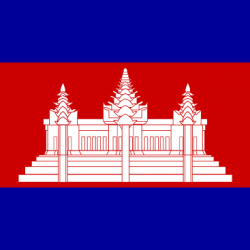
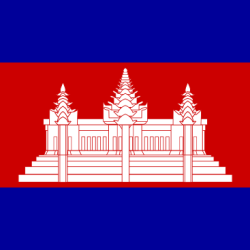
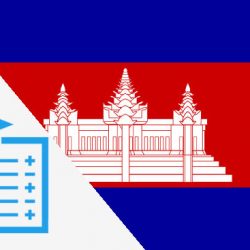
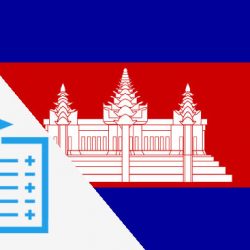
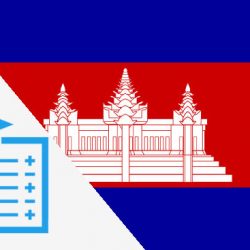
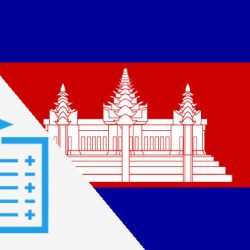
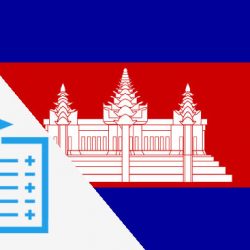
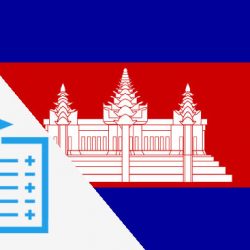
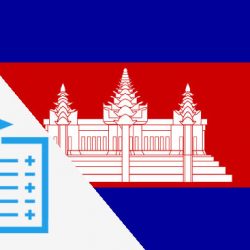
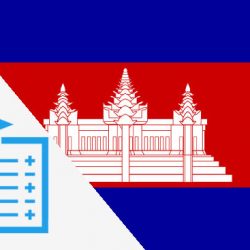
 We will not leak your personal information
We will not leak your personal information